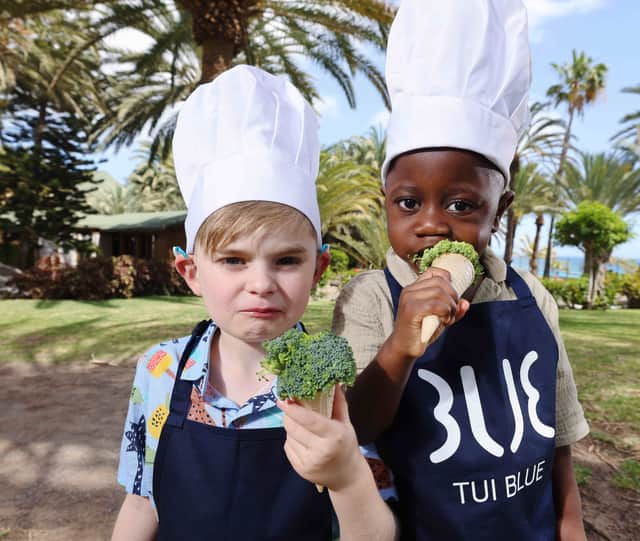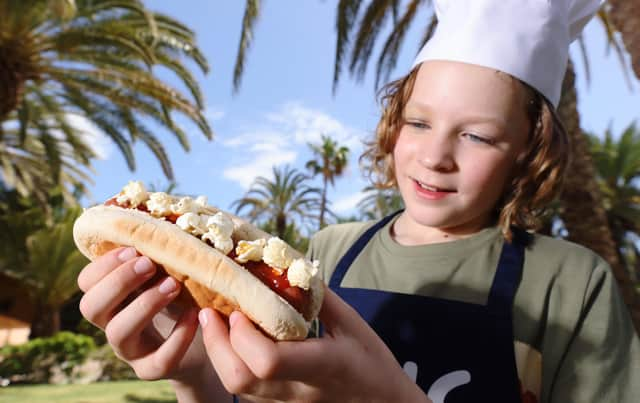Parents find their children are more willing to try new foods when on holiday


A poll of 600 parents and their children aged six to 11 found, while 72 per cent consider their little ones to be fussy eaters in general, their kids are receptive to trying new dishes overseas.
At home, parents are used to having a battle at the dinner table as they try and broaden their children’s horizons.
Advertisement
Hide AdAdvertisement
Hide AdAs a result, they’ve adopted strategies like making dishes into smiley faces (22 per cent), 'secretly' mixing vegetables into meals (34 per cent), and having their kids help cook (35 per cent) - all to boost their interest in cuisine.
However, the chances are they won't need to employ such methods during overseas getaways, as 68 per cent of the children polled like trying new exciting cuisines.
And 43 per cent of parents said their top priority when booking a holiday is finding a resort which offers a diverse selection of food.
The study was commissioned by TUI BLUE, which has launched ‘Adventurous Appetites’ – an initiative aiming to inspire kids to try new foods and create dishes of their own.
Advertisement
Hide AdAdvertisement
Hide AdIt found spring rolls are the most common foods children have tried while away, followed by paella, avocado, Greek salad and tacos.






Encouraging kids to be more adventurous trying new foods
Louise Bates, managing director of TUI BLUE said: "Food is a great way to learn about new cultures – and it’s fantastic so many children are receptive to trying new tastes when holidaying in another country.
“Our mission with Adventurous Appetites is to show how the freedom of holidays can encourage braver culinary choices.
"The initiative includes a combination of fun food related family challenges and activities involving all the senses and lots of unusual food combinations, and we’ve also got some handy hints and tips on our App.
Advertisement
Hide AdAdvertisement
Hide Ad“Holidays are a really liberating time when you leave behind your day-to-day routines, so it’s the perfect opportunity to shake up what and how we eat."
The study found while many kids are eager to try new foods, there are those who take a little encouragement.
Around four in 10 (37 per cent) children revealed they just want to eat their favourite dishes when away.
And of those youngsters who like to stick to what they know, 48 per cent said they are put off if the food ‘looks weird.’
Advertisement
Hide AdAdvertisement
Hide AdIn line with this 24 per cent of parents said their kids have refused to eat meals after they’ve arrived when dining out.
This might explain why 27 per cent have desperately tried to source their children’s most beloved dishes when on holiday.
So perhaps it’s no surprise 28 per cent of parents have filled their suitcases with their children’s favourite snacks when going away.
Carried out through OnePoll, the study also found 21 per cent of children believe making food with their parents could help them learn to taste and experience new foods.
Advertisement
Hide AdAdvertisement
Hide AdAnd 17 per cent would be willing to try new things – if their parents dressed up in a funny costume while serving it.
Kids also put mushrooms and brussels sprouts at the top of their most-hated food list, closely followed by broccoli and avocado - but they’re most likely to eat carrot, potatoes and sweetcorn.
Top 20 foods kids have tried for the first time when abroad on holiday:
1. Spring rolls
2. Paella
3. Avocado
4. Greek Salad
5. Tacos
6. Sushi
7. Samosa
8. Chicken Shawarma
9. Naan bread
10. Burritos
11. Fajitas
12. Korma curry
13. Chow Mein
14. Gnocchi
15. Tikka curry
16. Quesadillas
17. Bao buns
18. Escargot (snails)
19. Asian lettuce wraps
20. Empanadas